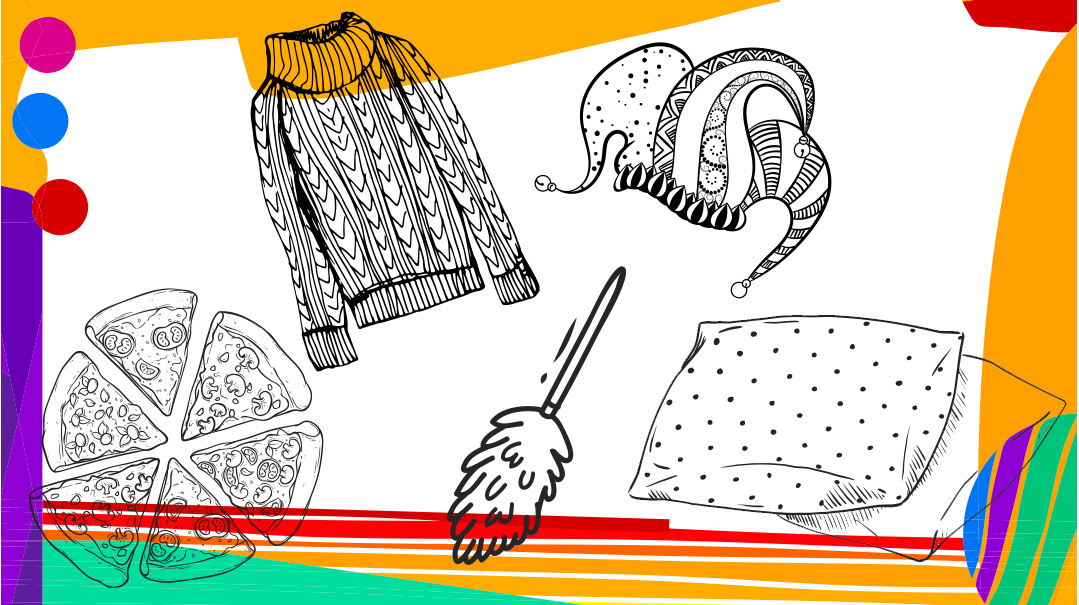Family Farce Tempo: The Missing Drawer

Bruchy suffered terribly, either with the challenge of mothering eight kids under the age of nine, or with an only child, or with the sudden fear that her first sentence was terribly cliché

B
ruchy stood in her kitchen. It was an ordinary kitchen, as most kitchens in frum fiction are wont to be, except that it had a missing drawer in the island, to make the story unique.
Bruchy was married to Baruch. “Two typical names, but also unique because of the alliteration, right?” Bruchy had mused to her best friend Gayil when she’d gotten engaged.
Gayil, who had a typical name with a twist, served the incredible purpose of filling spaces in all of Bruchy’s conflicts — and there were many — without the bother of having to have her own backstory, and also knowing exactly what to say when.
Bruchy and Baruch were married for ten years, and they had five children. No, that would be too perfect. They either had eight children, including a set of triplets, or they only had one child, born after nine years of marriage.
Bruchy suffered terribly, either with the challenge of mothering eight kids under the age of nine, or with an only child, or with the sudden fear that her first sentence was terribly cliché and should be something much more dramatic and suspenseful, like the hole where the island drawer was supposed to be glared at Bruchy like a beady-eyed monster.
Other than those troubles, Bruchy’s life was great.
Until the day everything changed.
It all started with a joke, one that the writer recently heard, so she found an opportunity to weave it into her story, because a joke is never complete before it’s repeated.
Bruchy, who was a growth-oriented character determined to leave readers inspired, loved listening to shiurim. When Gayil told her about a shiur being delivered by Rabbi Schonbrun, a great name for a generic fictional renowned speaker, Bruchy immediately agreed.
Later that night, after Bruchy somehow figured out babysitting arrangements (don’t expect to learn what they were, the writer has her own share of babysitting angst to deal with, she's definitely not taking responsibility for Bruchy’s), she didn't regret her decision. Rabbi Schonbrun was everything he was purported to be, “and then some,” Gayil added, in her most literary voice.
Bruchy leaned forward and drank in every word, happily quenching her thirst for inspiration as well as many other original turns of phrases.
“Give your husband choices!” Rabbi Schonbrun boomed over the microphone, because have you ever heard a sound over a microphone that didn’t boom? “If you treat him like an adult, he’ll behave like an adult. Everyone loves feeling independent, and the last thing you want to do is infantilize your husband.”
While Bruchy rolled the word infantilize on her tongue — proverbially, of course, as her tongue was occupied in the exercise of drinking words — Rabbi Schonbrun went on to suggest that wives do an experiment and inform their husbands that they get to choose the dinner menu once a week.
So Bruchy, who took things very literally when it benefitted the plot’s development, went home and told Baruch, “You get to choose what I should prepare for dinner every Tuesday night.”
“Meatballs and spaghetti,” Baruch responded immediately.
To which Bruchy retorted, “But I make that every night!”
“Exactly,” Baruch said, while sticking his hand into the empty drawer base in the island, because otherwise that detail would completely dangle. “You make meatballs and spaghetti every night, but I don’t like having it every night. That’s why I’m asking you to make it on Tuesday, so that you’ll make other dinners all other nights.”
Or something like that. It was funnier when the writer heard it, but too bad, that’s the life of a writer. At some point you just have to part from your baby (that is to say, your story), especially when Production starts sending menacing emails.
From there, it all went downhill.
Bruchy, as the reader could never have predicted, immediately started stewing. All the years of her married life replayed in her mind like a video on slow motion, or some better simile that the author can’t think of at the moment, and suddenly, all of Baruch’s flaws — and there were many — no, strikethrough, you can’t use the same line twice in a story, no matter how powerful it is — but there really were many, not as a turn of phrase, just as a fact, at least according to Bruchy’s wounded heart.
The problem was that Baruch didn’t notice.
And that only made things worse.
And worse. And worse. With every passing minute. Until it got so bad that Baruch came home Tuesday night to find that not only were there no meatballs and spaghetti on the menu, there was also no seltzer in the fridge, and everyone knew (and if they didn’t, they were finding out right now, together with the author) that if you ever wanted to get even with Baruch, you served him room — temperature seltzer.
Baruch was an astute character, or else the story would end right here with a nasty divorce, way before the writerreached her assigned word count, and he took stock. No meatballs and spaghetti, no seltzer, a scowling wife, and just 500 words left to a happy ending.
Raise the stakes, a voice that sounded eerily like the writer’s whispered in Baruch’s ear. Add a complication, quickly, make Bruchy go into labor, make Gayil have triplets, have a kid come out of bed sweetly asking for a cup of water, anything.
But with no fire alarms going off, Baruch was dumbstruck. So he did the only thing the writer could think of: nothing.
Oh, and he also stuck his hand into the empty drawer base, because once the detail was mentioned, it’s important to call back to it at least three times throughout the story, possibly even rounding back at the very end, with some impressively symbolic moral.
Before the writer had a chance to think, Bruchy had already thrown icy glares in Baruch’s general direction, cried on Gayil’s shoulder, and found herself on the long and complicated journey of therapy.
It was a painful era in Bruchy and Baruch’s life. Therapy peeled away at long-forgotten scars, petty squabbles over diaper brand choices, as well complex calculations around comments mothers-in-law made and what they truly meant, which is a whole story unto itself, one that the author isn't privy to so unfortunately can’t share with her curious readership.
But the camel’s back broke the day the very experienced and highly recommended by Gayil marriage counselor stared the couple in the eye — one eye on Bruchy and one on Baruch, apparently, since it was a singular penetrating stare — and dared to ask the loaded question.
“How did it all start?”
Bruchy looked at Baruch. Baruch looked at Bruchy. Both of them looked down at the floor and slowly, back up into the one staring eye of the marriage counselor, and — although the writer has never mastered the skill of having two characters say different things at the same moment —both of them responded at the same moment.
“M… m… meatballs,” Bruchy whispered.
“S… s… spaghetti,” Baruch whispered.
The slush of simultaneously whispered words led up to the most unexpected turn of events.
They burst out laughing.
Right there, in the therapist’s cozy, little office — or maybe it was actually a cool, spacious office, how is the writer to know, she’s not going to tell the entire readership whether she’s ever been in a therapist’s office, even if there is no more stigma.
It was embarrassing. It was shameful. It was mortifying. Because the writer was a believer in the musicality of repetition.
And it was so, so relieving. (See, if not for the beautiful musical intro, the relief would have fallen flat. And then the writer would need to show the palpable relief through action, but there were no missing drawers in the therapist’s desk, so where would Baruch stick his hand? Too complicated. Readers deserve a smooth reading experience.)
By the time the couple stumbled out of the office, starry eyed, the writer knew it was time to introduce the happy ending.
So she took the couple back home, to their ordinary kitchen. And Bruchy stood there, just like she did in the first sentence that she’d been afraid was terribly cliché, but this time, something was different.
The resolution greeted her eyes, sharp and stunning. A drawer — a real drawer — filled the gap in the island drawer base.
Baruch had surprised Bruchy and ordered the drawer.
And with that, all the conflicts in their lives were neatly stored inside the drawer and softly closed, allowing the writer to reach a resolution and submit her piece in peace.
(Originally featured in Family First, Issue 784)
Oops! We could not locate your form.





